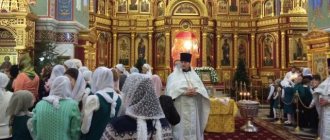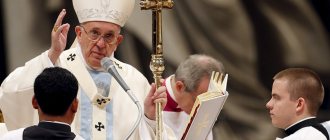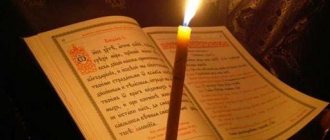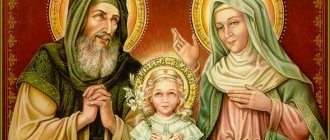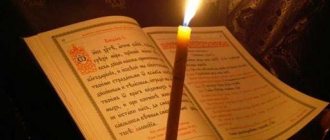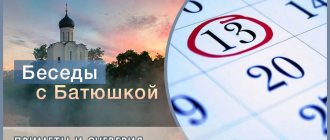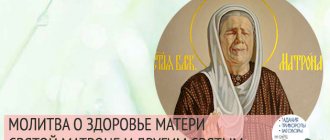Answer:
With bows in our churches, this is exactly the situation: who knows what. Who's stopping you from learning the rules? No one. Just lazy. The regulations on bowing are quite extensive, and you should not get acquainted with them on the newspaper square. It is located in the Typikon - the Book of Rules. I’ll say briefly about prostrations at the liturgy. We must remember that on Sundays, twelve and great holidays, as well as on the days from the Nativity of Christ to the Epiphany and from Easter to Pentecost, bowing to the ground is canceled by the charter. There is no prostration after communion of the Holy Mysteries. Moreover, when the temple is full, non-statutory genuflections make it very difficult for other worshipers. The Holy Fathers, however, do not forbid making bows from the waist to the ground at special moments of the liturgy: at the exclamation “We thank the Lord,” at the end of the song “We sing to you...”, after the exclamation “And vouchsafe us, O Master,” at the carrying out of the Holy Gifts, with the words “Come with the fear of God and faith” and a second time with the words “Always, now and ever.” The statute does not prohibit bowing with the cry “Holy to the saints.” In any case, you should be guided not only by your pious feelings.
Pentecost? - Hurray, on your knees!
Archpriest Alexy Sorokin, rector of the Vologda Church of the Holy Righteous Lazarus of the Four Days, talks with readers about the long-awaited prostrations that strict church regulations return to worship.
Kneeling prayers on the day of Holy Pentecost.
Photo: Pravoslavie.Ru - Pentecost is a huge celebration, the birthday of the Church: churches are decorated, everyone is happy, as at any birthday, even a human one.
But today is the most important birthday: the ship of our salvation - and you can probably say: the day of our spiritual birth. Then why does the strict, reasonable, calm and logical church charter, which, as has been tested over centuries and millennia, by definition not recommend anything unnecessary or unreasonable, so persistently prescribe kneeling prayers for Christians? It is unlikely that anyone will demand from the guests whom he invited to his own birthday, not genuflection, of course, but even some kind of apology. Why does the church charter insist on kneeling prayers? – In comparing the birthday of the Church with the birthday of a person lies the main “insidiousness” of this comparison in itself. We are accustomed to treating a birthday or another holiday as an event that “should make a person feel good.” In the Church, the meaning of the holiday includes, first of all, an edifying and instructive moment. To give something for thought, food and work of the soul, distracting from the hustle and bustle of ordinary everyday affairs. Yes, of course, in our tradition, the Easter holiday is associated with folk festivities, the Nativity of Christ is associated with congratulations and gifts - this is all clear. But, nevertheless, you need to try not to miss the inner content of the holiday itself, and this is the most important thing, isn’t it? And the day of Pentecost is not just a “memory” of the birthday of the Church, but it is, first of all, a person’s awareness of his place in the Church and what he has done to follow the path to salvation.
– Is this where the mystery of the strictness of the church charter, which seems at first glance complex, lies?
Oh, if only we were more attentive during services! What a treasure of Orthodoxy we possess!
– A person, seeing himself on the path of salvation as infirm, weak, sinful, asks that the Holy Spirit, given by God to His Church, does not leave us, strengthens us, heals us from our weaknesses and spiritual passions. This is what is said in the kneeling prayers. The contradiction you are talking about would be removed if people knew the text of the prayers read during Vespers of Holy Pentecost. If we open it and read carefully the text of the prayers, we will see the answer to this question and resolve many confusions. Here, look: “Most pure, undefiled, without beginning, invisible, incomprehensible, unsearchable, unfailing, invincible, innumerable, gentle, Lord... Receive us, who fall before You and cry: we have sinned, we have been committed to You from the womb, from the womb of our mother, You are God our. But as if our days had disappeared in the vanity, we were exposed to Your help, deprived of any answer, but boldly in Your bounty, we call: do not remember the sins of our youth and ignorance, and cleanse us from our secrets, and do not reject us during old age, when our strength becomes impoverished. ours: do not leave us, before we can even return to the earth, grant us worthy to return to You, and grant us favor and grace. Measure our iniquities with Your bounties, set the abyss of Your bounties against the multitude of our sins. Look down from Thy holy height, O Lord, upon Thy people who are coming, and upon those who expect rich mercies from Thee. Visit us with Thy goodness, deliver us from the violence of the devil: establish our life with Thy holy and sacred laws. Assign a faithful guardian angel to Your people, gather everyone into Your Kingdom. Grant forgiveness to those who trust in You: forgive them and our sins. Purify us through the action of Your Holy Spirit: destroy the machinations of the enemy even against us.”
Oh, if only we were more attentive during services! What a treasure of Orthodoxy we possess!
Archpriest Alexy Sorokin
– So, the main meaning of the prayers at Pentecost Vespers is a person’s awareness of his unenviable spiritual state?
– Regarding Christians living on earth, yes: their main meaning is to recognize oneself as a person who has the possibility of salvation, who has been given such an opportunity and who has all the means for salvation. But due to our laziness, weakness, vanity, we neglect this and fall into such terrible traps that alienate us from God. And so, when a person sees this, honestly admits it, he asks the Lord to give him strength - and the Holy Spirit gives strength in the sacraments - to give him strength to fight sin. He gave us strength to follow the path of salvation, he gave us strength, strengthening our weak, crippled, sinful human rhythm of life, in order to remain a Christian in it always and everywhere, at all times of the day and night.
- It's clear. Then a question that probably worries many parishioners, and not only parishioners, but also clergy. Don't you think that the words of these prayers, like other prayers, often do not reach those who are praying or trying to pray? The words of the prayers are too incomprehensible, they are read too quietly, or, what is even worse, there is too much fuss and twigs that “must certainly be blessed,” and this, according to many, is the main meaning of today’s holiday. Doesn’t the ritual often overshadow the content? Much more attention is paid to the external - these very notorious branches - than to the internal, which is exactly what you were talking about.
It probably makes sense to print out the texts of these prayers and give them to parishioners so that they know them.
– Twigs are also necessary to show a person before his eyes the life-giving action of the Holy Spirit. A seemingly dead branch, which in autumn and winter looks completely lifeless, with the onset of spring begins to blossom, bloom, leaves come out and then fruits come out. This greenery of the trees reminds us of the life-giving effect of the Holy Spirit on the withered human soul. Although, of course, this is only an external reminder of internal work. And, of course, it can be very disappointing when the bustle in church distracts people from prayer. It is difficult to imagine if in some large cathedral, especially if there is no amplifying equipment, at the end of the temple someone would hear what a priest or bishop was reading there, kneeling in the royal doors. Therefore, it probably makes some sense to print out the texts of these prayers in Church Slavonic and give them to parishioners, especially regular parishioners who understand what spiritual life is, who sincerely follow it, experience and repent of their sins, and rejoice in the Church, so that they knew the texts of these prayers. After all, the Penitential Canon of St. Andrew of Crete is published, say, in a separate edition. We see that in churches many lay people kneel or stand, carefully following the priest’s reading, thereby compensating for all our human weaknesses - voice, diction, inattention, and something else. And in these publications there are certain kinds of explanations, and sometimes translations. That is, it would be good to provide such reference publications in order to better understand the meaning of prayers, and for the prayers of Holy Pentecost. This is a prayer read facing the people, out loud; there is nothing to hide from the people.
The prayers of Holy Pentecost are also prayers for the departed, for those who are no longer with us.
Moreover, there is another side to the content of the prayers of Holy Pentecost, and it is connected with prayer for the departed. Prayer for the departed and about the feeling of love and concern that the Church shows before God for those who are no longer with us, but have passed on to another world and can no longer do anything for their salvation there. Only we here on earth can help them in their posthumous fate. Now we will try to find those words that relate to the departed in the prayers of Holy Pentecost. These are very good words. Speaking about prayers, praising the mercy of God, His Providence and the path that the Lord accomplished for our salvation, the Church turns to Him with amazing words:
“...You are the ever-present glory, Lord, and the beloved Son of the Most High, ever-present Light from the ever-present Light, Sun of righteousness, hear us praying to You, and give rest to the souls of Your servants, the fathers and our brothers who have fallen before the dead, and other relatives in the flesh, and all your in faith, we create a memory of them now, for in You is the power of all, and in Your hand you contain all the ends of the earth. Master Almighty, Father God and Lord of mercy, the mortal and immortal race, and the Creator of all human nature, which is composed, and again resolved, life and death, every stay here, and every change there: measure the years of the living, and set the times of death , bring down to hell and raise up, bind in weakness, and release in strength, build the present needs, and manage the future usefully, cheering those wounded by the sting of death with the hopes of resurrection... And on this all-perfect and saving holiday, purification for prayer, for those held in hell being worthy to receive, give us great hope of weakening the contents from the defilements that I contain, and to receive consolation from You. Hear us humble ones, and Your servants praying to You, and give rest to the souls of Your servants, who have fallen before the dead, in a place of light, in a place of greenness, in a place of coolness: from there shall flee all sickness, sorrow and sighing, and rest their spirits in the villages of the righteous, and peace and vouchsafe them to be weakened: for they will not praise Thee in the dead, O Lord; those lower in hell will dare to bring confession to Thee, but we, while we live, will bless Thee and pray, and offer cleansing prayers and sacrifices to Thee for their souls.”
Kneeling prayers on the day of Holy Pentecost. Photo: Pravoslavie.Ru
As we see, there are words here that can also be applied to intercession for souls in hell.
– These prayers make sense when they are known, like any other prayers that a person reads in the temple, don’t they?
- Certainly. There is appropriate explanatory literature for people who want to learn about the rich treasure of Orthodox worship. After all, in fact, it is unreasonable to stand at the rich table, which belongs to you by right, which has been set for you and where you are invited every day, but, citing being busy, the incomprehensibility of the texts, or whatever else, stubbornly eat stale and moldy crusts.
– Practice shows that many parishioners – exactly the same ones you spoke about: diligent, conscious, constant – greet with great joy the return of kneeling prayers to liturgical life.
Each bow to the ground is a reminder of both the Fall and the rebirth of man through the Resurrection of Christ.
- Yes. Kneeling returns us to the usual rhythm of bowing rules accepted in church communication. However, we must remember: we are not on our knees all the time during the service. Even after Pentecost. When it comes to bowing, what does it mean? Its symbolic meaning is a reminder of man's restoration in Christ. We fall to our knees, showing our fall. Moral decline. But we get up from our knees, because Christ called us to get up from them. And this is the path of our whole life: we fall and get up, fall and get up. Therefore, bowing is included in the prayer rule of an Orthodox person, in the daily rule, and, if we look at the rule of morning and evening prayers, the rule for Communion: “And bow as much as you want.” That is, as many times as you feel your unworthiness, you make these bows and just as many times you hope for God’s mercy. Bowing is not only slavish worship, but also a moment associated with rebellion. By the way, remember: after all, “uprising” in Greek is “anastasis”, that is, resurrection: there is something to think about, and every day. Each bow to the ground is a reminder of both the Fall and the rebirth of man through the Resurrection of Christ. And the fact that we are on our knees at Pentecost is simply an understanding that we are without God - that’s who we are, and the Holy Spirit, Who descends during Pentecost, leads us to the path of salvation. If only we would not disturb Him with our sins.
When is it permissible to prostrate?
In this matter, clergy recommend being guided by the traditions of a particular parish and general church rules. Thus, it is customary to bow to the ground in front of the shrouds of the Mother of God and Jesus Christ, the Crucifixion, the relics of saints, relics and icons that are classified as especially revered.
During Lent, the laity kneel 4 times while saying the prayer of St. Ephraim the Syrian “Lord and Master of my life...”. In other cases, it is recommended to follow the traditions accepted in a particular parish. If there is any doubt, it is best to seek advice from your local priest.
( 17 ratings, average: 5.00 out of 5)
Secular tradition
If kneeling was performed by Russians only on especially solemn occasions, during great national misfortune or when kissing highly revered miraculous icons, then bowing from the waist in pre-revolutionary Russia was used not only during prayer, but was also the main form of polite greeting in society. They honored parents with a bow from the waist and expressed respect to society; commoners also bowed “to the waist” to representatives of the clergy, nobles and the king. In cases of special gratitude or veneration, a heartfelt bow was also used - during a bow from the waist, the right hand was pressed to the heart.
Among the nobles, a bow from the waist was accepted only when honoring the highest clergy and members of the royal family, and when greeting each other, they limited themselves to a slight bow of the head. Also, a penitential bow was accepted by the nobles before execution - thereby they not only asked for forgiveness from the people, but also signified their purity and innocence.


